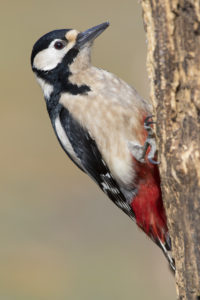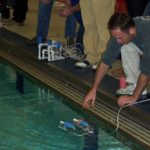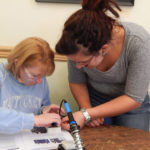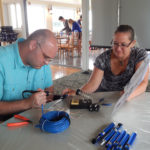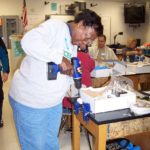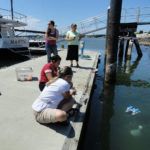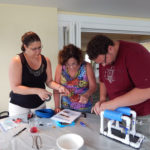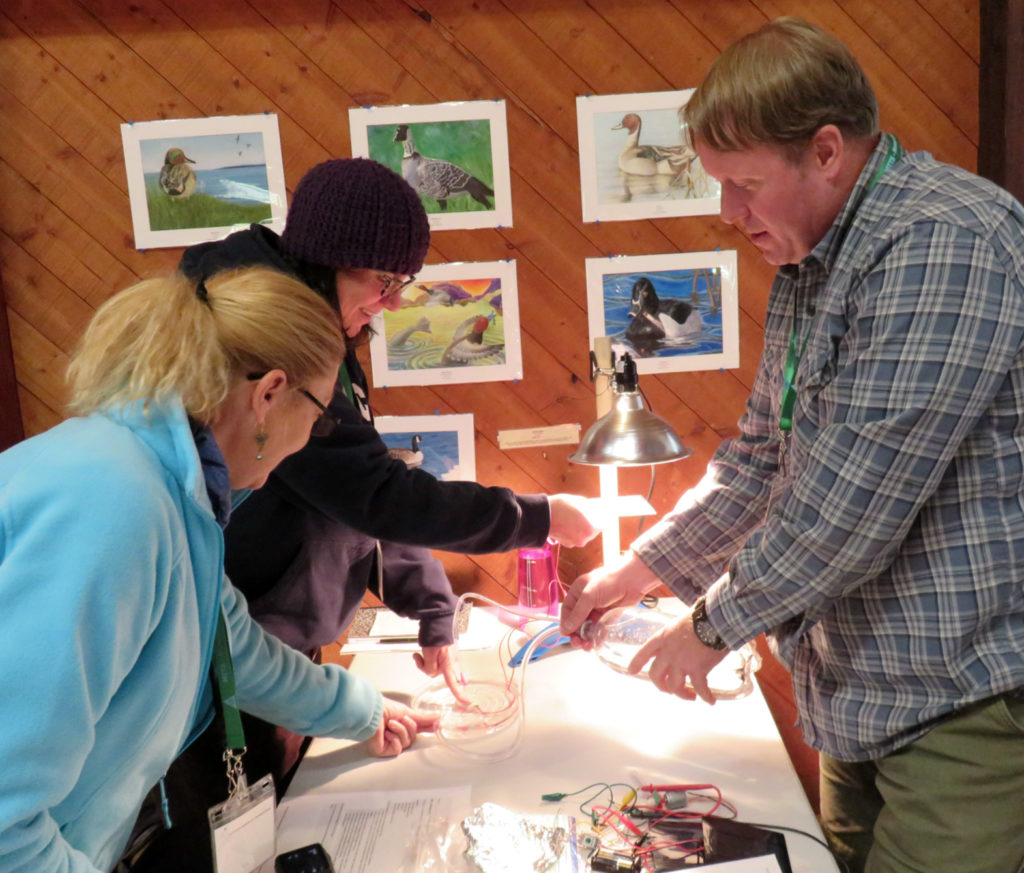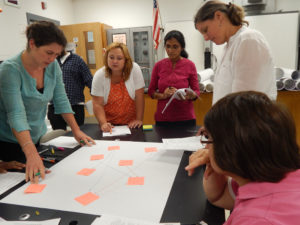Focus Workshops are multi-day professional learning opportunities that provide a deep dive into content and inquiry investigations focusing on one STEM discipline. Browse through information about our previous Focus Workshops below!
Previous workshops have included…
Rise to the Challenge Focus Workshop Series
Get ready to Rise to the Challenge in this Focus Workshop series based on our Massachusetts STEM Week Challenges. From extreme weather to deserted islands and zoo makeovers, there’s a challenge for everyone! In each workshop you’ll experience a variety of hands-on, inquiry-based STEM activities designed to support your students in using the Science and Engineering Practices. You’ll also explore how phenomena can spark curiosity, drive investigation, and make the learning relevant for students. The challenges are designed for middle school students but are easily adaptable to upper elementary or high school settings. You have the option to take one, two, or all three workshops. At the conclusion of each workshop you’ll receive a curriculum packet and materials kit to implement the challenge in your classroom. PDPs and optional Graduate Credits are offered for all 3 workshops.
Hurricane Heroes
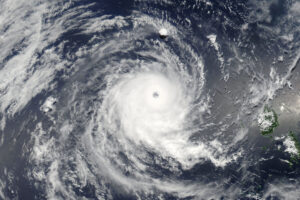
Challenge: A category 4 hurricane has hit fictional Storm City, Massachusetts. The city faces several problems that can only be solved by your engineering team.
Investigations include evacuating citizens, building shelter, moving floodwaters, and designing alternative energy sources. The challenge culminates in a redesign of the city’s resources to prevent future disaster. During the workshop you will participate in all elements of the challenge and have the opportunity to collaborate and reflect with instructors and fellow attendees.
Survivor Island Challenge
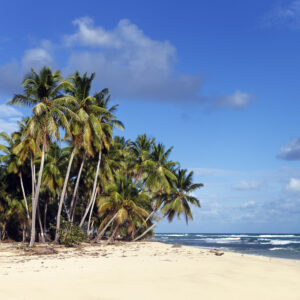
Challenge: You have been stranded on a deserted island and while you’ve found a safe place to build a rustic encampment, your team still must figure out how to survive. Activities include moving and filtering water from a fresh water resource using materials washed up onto the island.
You will work with solar panels, water pumps, windmills and other alternative energy sources as you design and build a system for moving and filtering water from a fresh water resource to your encampment. Throughout the challenge students keep a survivor’s logbook to document their ideas and results. You’ll participate in all elements of the challenge and have the opportunity to collaborate and reflect with instructors and fellow attendees.
Extreme Zoo Makeover
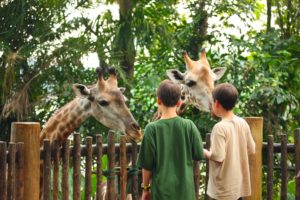 Challenge: Your local Zoo wants a makeover! As we learn more about animals’ needs, we’ve realized the Zoo’s old habitats are no longer adequate and it’s up to you and your engineering team to redesign them. You must find a way to 1) design habitats that meet the specific needs of the animals for which you are designing them, 2) engineer an enrichment item for your animal species that will stimulate natural behaviors, and 3) create an interpretive sign and interactive features that will engage the public in your animal habitat.
Challenge: Your local Zoo wants a makeover! As we learn more about animals’ needs, we’ve realized the Zoo’s old habitats are no longer adequate and it’s up to you and your engineering team to redesign them. You must find a way to 1) design habitats that meet the specific needs of the animals for which you are designing them, 2) engineer an enrichment item for your animal species that will stimulate natural behaviors, and 3) create an interpretive sign and interactive features that will engage the public in your animal habitat.
Investigations include designing habitats that meet the specific needs of different animals, engineering an enrichment item, and creating an interpretive sign with interactive features. The challenge culminates in the design, construction, and presentation of a model zoo habitat for a chosen animal. During this workshop, you’ll participate in all elements of the challenge, explore how the Buttonwood Park Zoo supports the animals in their care, and have the opportunity to collaborate and reflect with instructors and fellow attendees.
Thank you to the following organizations who helped fund
the 2024 Rise to the Challenge Focus Workshop Series:
Brabson Family Foundation The Dorr Foundation Esther B. Kahn Charitable Foundation
Open Access Professional Learning Program
This course was offered as part of Accelerating Science: Open Access Professional Learning Courses for Massachusetts educators. Eligible Massachusetts educators were able to take this course for free with a $300 stipend.
Engaging Students in the Engineering Design Process Using Sensors: Level 2
A Focus Workshop for Grades 6-12 Educators
An Approved Course for MA DESE’s Accelerating Science: Open Access Professional Learning
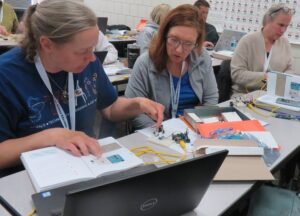 Join us for an advanced workshop focused on reverse engineering and problem based learning. Build and program a robot capable of carrying a variety of data collecting sensors. Explore what the engineering practices look like in the classroom as you experience inquiry investigations and phenomena-based learning. Receive an advanced Arduino kit to take back to your classroom. Included in the kit is an autonomous INR robot, multiple sensors and camera module. You will design and create working autonomous robot prototypes. Reverse engineering will be used to identify improvements you want to design. Improvements can include mechanical, programmatic, and/or sensor design.
Join us for an advanced workshop focused on reverse engineering and problem based learning. Build and program a robot capable of carrying a variety of data collecting sensors. Explore what the engineering practices look like in the classroom as you experience inquiry investigations and phenomena-based learning. Receive an advanced Arduino kit to take back to your classroom. Included in the kit is an autonomous INR robot, multiple sensors and camera module. You will design and create working autonomous robot prototypes. Reverse engineering will be used to identify improvements you want to design. Improvements can include mechanical, programmatic, and/or sensor design.
For those schools who have restricted cell phone use, we have you covered! We will be giving you an infrared robot that has its own controller. No cell phones needed!
- Plan out and program a robot using either Arduino C or Block Programming
- Incorporate sensors into the robot design
- Use sensor data to create autonomous robots
- Gain a better understanding of engineering design concepts
- Investigate strategies for problem-based learning
- Identify and solve a community problem using robotics
Participants will receive an Arduino kit to take back to their classroom. We recommend taking the first level sensor workshop prior to enrolling in this workshop.
Arrange for this workshop for your school or school district:
Contact the Wade Institute at 617-328-1515 or wadeinstitute@wadeinstitutema.org.
Open Access Professional Learning Program
This course was offered as part of Accelerating Science: Open Access Professional Learning Courses for Massachusetts educators. Eligible Massachusetts educators were able to take this course for free with $300 substitute pay.
Exploring Instructional Strategies That Promote
Student Sensemaking and Student Discourse
A Focus Workshop for Grades 9-12 Educators
An Approved Course for MA DESE’s Accelerating Science: Open Access Professional Learning
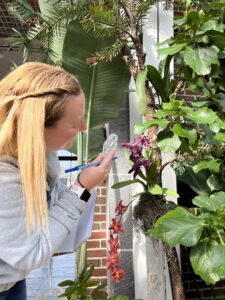
In this 2-day in-person workshop, teachers will be guided in the use of instructional strategies central to storyline teaching, including phenomena-based instruction, using a Driving Question Board to promote student questions and ownership, and student discussion. Teachers will be able to think critically about phenomena-based instruction and consider its power for promoting students’ deep understanding of Disciplinary Core Ideas, developing their skills in using the Science and Engineering Practices, and strengthening their ability to apply the Crosscutting Concepts of science and engineering.
Using recently released OpenSciEd High School Biology curriculum as a foundation, the program will introduce the use of storylines as a tool that fosters students’ sensemaking. We will work with an anchoring phenomena, engaging in inquiry-based investigations related to evolution and genetic diversity as students would to help understand this phenomena. In collaboration with our partners from the USDA’s Springfield Urban Field Station we will explore local related phenomena. Model building and discussion are important components of storyline teaching, and we will explore both of these strategies as tools to promote student learning. Throughout this professional learning program, teachers will have opportunities to engage with their peers to discuss and plan for implementation of their learning in their own classrooms.
Focus questions for the content of this Professional Learning Experience will include:
- What does phenomena-based instruction look like in the classroom?
- How does teaching with storylines differ from what I already do?
- What features of phenomena-based instruction and storylines can improve student learning?
- How do phenomena-based instruction and storylines support equity in my classroom?
In this program you will:
- Explore an anchoring phenomenon as a driver for a unit
- Identify phenomena relevant to your local community
- Participate in place-based learning experiences related to urban bird and tree populations
- Practice productive talk moves to support classroom discussions
- Research the role of urbanization in plant and animal evolution
- Explore the impact of habitat fragmentation on genetic diversity
- Evaluate urban planning designs that support human and non-human populations
Arrange for this workshop for your school or school district:
Contact the Wade Institute at 617-328-1515 or wadeinstitute@wadeinstitutema.org.
Open Access Professional Learning Program
This course was offered as part of Accelerating Science: Open Access Professional Learning Courses for Massachusetts educators. Eligible Massachusetts educators were able to take this course for free with $150 substitute pay.
A Focus Workshop for Grades 6-12 Educators
An Approved Course for MA DESE’s Accelerating Science: Open Access Professional Learning
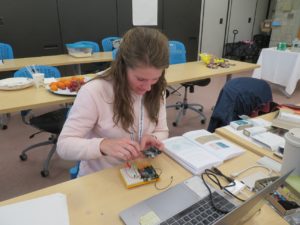
In this two-day workshop for 6-12 educators, we explored coding and engineering design concepts through fun, engaging, hands-on projects using the Arduino Electronics Platform.
The program started with an introduction to the Science and Engineering practices (SEPs), and an exploration of the progressions students make in the SEPs as they move from kindergarten through high school. With this foundation, participants moved into an activity centered on using phenomena in problem-based learning – to build a prototype lighthouse that would support an Arduino breadboard! In the first day of the program, educators learned about circuits, circuit diagrams and coding in preparation for completing a series of challenges using the Arduino sensors, including a Love-o-Meter and a Mood Cue.
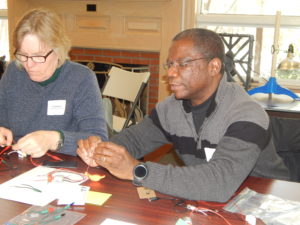 During the second day of the program, educators blended Tinker CAD Circuits into their Arduino sensors projects, as a tool for designing prior to building – and worked on Motorized Pinwheels and a Light Theremin. Problem solving was also featured, with teachers presented with a Broken Traffic Light in Tinker CAD which they then fixed and built with their Arduino sensors. Teachers were tasked with producing a standards based lesson plan using Arduinos in their classroom. The lessons were shared among participants to provide educators with a suite of lessons as they completed the workshop. Educators also left the program with an Arduino Sensors kit to use in their classrooms.
During the second day of the program, educators blended Tinker CAD Circuits into their Arduino sensors projects, as a tool for designing prior to building – and worked on Motorized Pinwheels and a Light Theremin. Problem solving was also featured, with teachers presented with a Broken Traffic Light in Tinker CAD which they then fixed and built with their Arduino sensors. Teachers were tasked with producing a standards based lesson plan using Arduinos in their classroom. The lessons were shared among participants to provide educators with a suite of lessons as they completed the workshop. Educators also left the program with an Arduino Sensors kit to use in their classrooms.
Arrange for this workshop for your school or school district:
Contact the Wade Institute at 617-328-1515 or wadeinstitute@wadeinstitutema.org.
Open Access Professional Learning Program
This course was offered as part of Accelerating Science: Open Access Professional Learning Courses for Massachusetts educators. Eligible Massachusetts educators were able to take this course for free with $150 substitute pay.
A Focus Workshop for Grades 9-12 Educators
An Approved Course for MA DESE’s Accelerating Science: Open Access Professional Learning
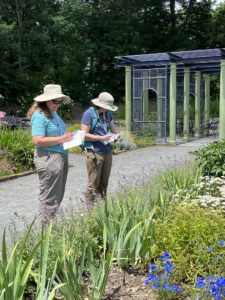 Explore how to use storyline routines and anchoring phenomena to shift your curriculum to student-centered science learning as you explore the relationship between humans and the natural environment. In this workshop, you’ll follow a storyline unit focused on sustainability, management of natural resources, ecosystems health, design solutions, and more. You’ll engage in a few lessons from the unit as a learner, including the anchoring phenomenon routine and student-driven inquiry investigations, then reflect on those experiences as a teacher. During the workshop, you will learn how to construct a storyline unit, incorporate relevant phenomena, and utilize best practices for DEI in the STEM classroom, including establishing classroom norms and processes that value all student resources. You will leave the program with an outline of a storyline unit, inquiry investigations to use in your classroom, and resources for developing your own storyline unit using culturally relevant phenomena.
Explore how to use storyline routines and anchoring phenomena to shift your curriculum to student-centered science learning as you explore the relationship between humans and the natural environment. In this workshop, you’ll follow a storyline unit focused on sustainability, management of natural resources, ecosystems health, design solutions, and more. You’ll engage in a few lessons from the unit as a learner, including the anchoring phenomenon routine and student-driven inquiry investigations, then reflect on those experiences as a teacher. During the workshop, you will learn how to construct a storyline unit, incorporate relevant phenomena, and utilize best practices for DEI in the STEM classroom, including establishing classroom norms and processes that value all student resources. You will leave the program with an outline of a storyline unit, inquiry investigations to use in your classroom, and resources for developing your own storyline unit using culturally relevant phenomena.
Using the storyline approach we will:
- Explore an anchoring phenomenon that sparks wonder at the start of the unit
- Identify phenomena relevant to your local community
- Demonstrate the importance of biodiversity in an ecosystem
- Evaluate competing design solutions for minimizing impacts to the natural environment
- Observe the relationship between humans and nature in the Blackstone River Valley
- Participate in place-based learning experiences
- Complete a culminating activity for the unit
This course was FREE for eligible MA educators through MA DESE’s Accelerating Science: Open Access Professional Learning Courses.
Arrange for this workshop for your school or school district:
Contact the Wade Institute at 617-328-1515 or wadeinstitute@wadeinstitutema.org.
Open Access Professional Learning Program
This course was offered as part of Accelerating Science: Open Access Professional Learning Courses for Massachusetts educators. Eligible Massachusetts educators were able to take this course for free with a $150 stipend.
A Hybrid Focus Workshop for Grades 4-6 Educators
An Approved Course for MA DESE’s Accelerating Science: Open Access Professional Learning
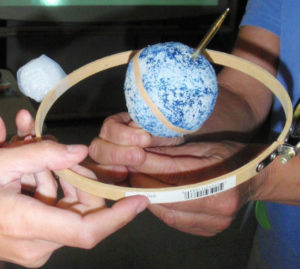
In this hybrid online and in-person 2-day workshop for upper elementary educators, participants dove into an exploration of our solar system, and the Earth’s place in the universe – through the lens of STEAM (Science, Technology, Engineering, Art and Math).
The workshop began in the virtual platform, using images from the James Webb Space Telescope and a video rendering of the scale of our universe as our inspiration – recognizing that all of the fields of STEAM went into the generation of these images. Through case study readings and discussion, we learned about authentic art integration in the classroom, and educators prepared to bring these ideas into their classroom. Educators then put on their “student hats” to dissect images of planetary bodies and understand the geological processes at work – using the principles of art to aid in our understanding. Back in “teacher hat”, an exploration of the MA Arts Curriculum Framework helped educators look for links to their curriculum.
During our in-person day at the Springfield Museums, educators continued our work connecting the arts and our exploration of the solar system through participating in a “living orrery”, led by our partner from the Beneski Museum at Amherst College. Educators experienced a visit to the Springfield Museum’s Seymour Planetarium to help further our understanding of the sun, earth, moon system and planetary motion – and brainstorm field trip experiences for their students.
Next, a discussion of the levels of inquiry and strategies to increase student independence in inquiry were followed by a student-hat Moon crater investigation – where the principles of art were again applied in communicating data about our investigation results. To wrap up our day, we were guided through using the Springfield Museums’ rooftop and portable telescopes – seeing the planetary bodies we’d been studying with our own eyes!
Our program returned to the virtual space to discuss different forms of assessment in the STEAM classroom – evaluating both art and science content. As our final student hat assessment, educators used the principles of art to create their own planetary art, with their colleagues gathering evidence to interpret the geological processes seen in their art!
This course was FREE for eligible MA educators through MA DESE’s Accelerating Science: Open Access Professional Learning Courses.
Arrange for this workshop for your school or school district:
Contact the Wade Institute at 617-328-1515 or wadeinstitute@wadeinstitutema.org.
Open Access Professional Learning Program
This course was offered as part of Accelerating Science: Open Access Professional Learning Courses for Massachusetts educators. Eligible Massachusetts educators were able to take this course for free with a $150 stipend.
A Focus Workshop for Grades 3-5 Educators
An Approved Course for MA DESE’s Accelerating Science: Open Access Professional Learning
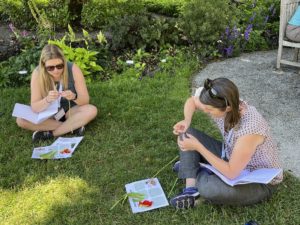 The Focus Workshop, Building the Storyline, was built to help teacher participants deepen their understanding of the storyline approach to phenomena teaching while also gaining the scientific content knowledge to create and teach a unit. Over the course of two onsite days, participants integrated phenomena-based pedagogy, the Science and Engineering Practices (SEPs), work with garden educators at partner location the New England Botanic Garden at Tower Hill, and the application of teaching and learning about plant life cycles.
The Focus Workshop, Building the Storyline, was built to help teacher participants deepen their understanding of the storyline approach to phenomena teaching while also gaining the scientific content knowledge to create and teach a unit. Over the course of two onsite days, participants integrated phenomena-based pedagogy, the Science and Engineering Practices (SEPs), work with garden educators at partner location the New England Botanic Garden at Tower Hill, and the application of teaching and learning about plant life cycles.
Teachers experienced an anchoring phenomenon routine and were guided through the planning and outline of their own unit, while instructors modeled how to set norms in a DEI-centered classroom, including respect, equity, and commitment to community. Participants then made a nature journal with recycled materials with support from the Botanic Garden education team.
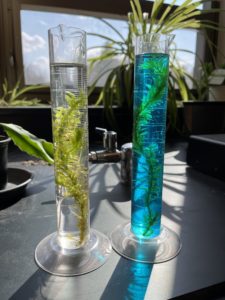 Participants engaged in many experiences about plant life cycles and basic plant needs as a learner, including botanical sketching, flower dissection, and a “bean in a bag” investigation. Participants conducted another inquiry investigation to explore inherited vs. environmental traits and plant adaptations in a variety of environments. Afterwards, instructors guided them through a group discussion in which they’ll put together the pieces of what they’ve learned throughout the unit and how to use the storyline approach in their own education setting. Teachers concluded with a project to create their own storyline unit, including anchoring and investigative phenomena around science content learning in the workshop.
Participants engaged in many experiences about plant life cycles and basic plant needs as a learner, including botanical sketching, flower dissection, and a “bean in a bag” investigation. Participants conducted another inquiry investigation to explore inherited vs. environmental traits and plant adaptations in a variety of environments. Afterwards, instructors guided them through a group discussion in which they’ll put together the pieces of what they’ve learned throughout the unit and how to use the storyline approach in their own education setting. Teachers concluded with a project to create their own storyline unit, including anchoring and investigative phenomena around science content learning in the workshop.
This course was FREE for eligible MA educators through MA DESE’s Accelerating Science: Open Access Professional Learning Courses.
Arrange for this workshop for your school or school district:
Contact the Wade Institute at 617-328-1515 or wadeinstitute@wadeinstitutema.org.
Investigating Climate Change: Exploring Resources and Data for the Classroom
A 2-day workshop for grades 6-12 educators
Friday, December 2nd and Saturday, December 3rd, 2022
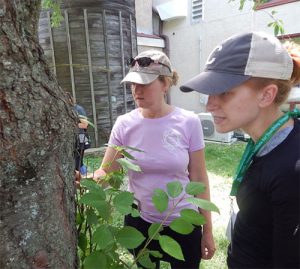 Explore how you can prepare your students to engage with climate change data and deepen their understanding of the key principles of climate change. Participants will investigate climate change phenomena, work with scientists, and take part in inquiry-based learning experiences. Instructors from the Wade Institute and our collaborating partner, Salem Sound Coastwatch will immerse you in experiments and investigations to collect and interpret data, demonstrate climate systems, and investigate locally relevant phenomena. Work with teaching resources including Data Nuggets, En-Roads, CLEAN Net, and the GLOBE Program. Northeastern University Professor Brian Helmuth will highlight the importance of local environmental data and solutions inland and on the coastline from both human and non-human perspectives. He will share information about ocean temperature data collection using robomussels and guide participants in using a storymap of urban heat island data. Then gain a deeper understanding of the climate system with UMASS Boston Professor Bob Chen, linking it to the carbon and water cycles and the flow of energy in Earth systems. Participate in a systems thinking activity that you can use with your students. You’ll leave the workshop with tools and resources for integrating climate change into your instruction and the confidence to engage your students in data collection and analysis, systems thinking, and problem solving around challenging and dynamic topics of climate change.
Explore how you can prepare your students to engage with climate change data and deepen their understanding of the key principles of climate change. Participants will investigate climate change phenomena, work with scientists, and take part in inquiry-based learning experiences. Instructors from the Wade Institute and our collaborating partner, Salem Sound Coastwatch will immerse you in experiments and investigations to collect and interpret data, demonstrate climate systems, and investigate locally relevant phenomena. Work with teaching resources including Data Nuggets, En-Roads, CLEAN Net, and the GLOBE Program. Northeastern University Professor Brian Helmuth will highlight the importance of local environmental data and solutions inland and on the coastline from both human and non-human perspectives. He will share information about ocean temperature data collection using robomussels and guide participants in using a storymap of urban heat island data. Then gain a deeper understanding of the climate system with UMASS Boston Professor Bob Chen, linking it to the carbon and water cycles and the flow of energy in Earth systems. Participate in a systems thinking activity that you can use with your students. You’ll leave the workshop with tools and resources for integrating climate change into your instruction and the confidence to engage your students in data collection and analysis, systems thinking, and problem solving around challenging and dynamic topics of climate change.
If you opt to take this workshop for graduate credit, additional homework and a final project are required, to be due before December 16th.
Partially funded by Cell Signaling Technology and the Vanderbilt Family Foundation.
Arrange for this workshop for your school or school district:
Contact the Wade Institute at 617-328-1515 or wadeinstitute@wadeinstitutema.org.
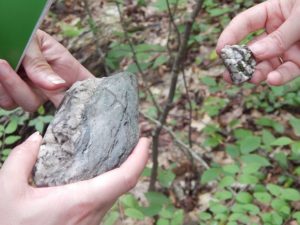
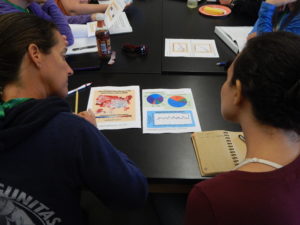
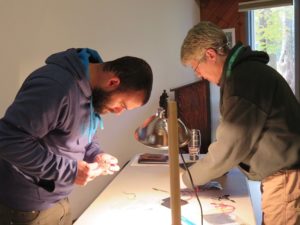
Connecting Science and Literacy in the Elementary Classroom
A virtual professional learning opportunity for Grades 3-5 educators
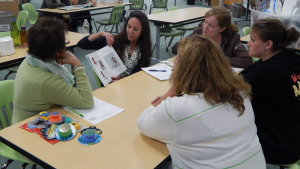 Join the Wade Institute and the EcoTarium as we explore the use of picture and trade books, as well as other tools for integrating science and literacy skills in the classroom. Discover the amazing world of squirrels as we engage in phenomena-based science instruction exploring animal behavior, like the physical and behavioral adaptations that make squirrels part gymnast, part economist, part bandit, and completely irresistible. Get a squirrel’s-eye view of engineering and life science topics such as feeder building challenges, and skull morphology, and find fun ways to teach students about the symbiotic relationship between oak trees and the nut-loving critters with whom they co-exist. Gain strategies for finding and using quality picture books and other texts. We will investigate using “Notice and Wonder” protocol, science journals, probing questions, and other pedagogical strategies as we learn about these dynamic creatures you can observe in your schoolyard. You’ll leave the workshop with science investigations that incorporate the concepts explored throughout the workshop, meet 3rd-5th grade science education standards, and model using the Science and Engineering Practices in the
Join the Wade Institute and the EcoTarium as we explore the use of picture and trade books, as well as other tools for integrating science and literacy skills in the classroom. Discover the amazing world of squirrels as we engage in phenomena-based science instruction exploring animal behavior, like the physical and behavioral adaptations that make squirrels part gymnast, part economist, part bandit, and completely irresistible. Get a squirrel’s-eye view of engineering and life science topics such as feeder building challenges, and skull morphology, and find fun ways to teach students about the symbiotic relationship between oak trees and the nut-loving critters with whom they co-exist. Gain strategies for finding and using quality picture books and other texts. We will investigate using “Notice and Wonder” protocol, science journals, probing questions, and other pedagogical strategies as we learn about these dynamic creatures you can observe in your schoolyard. You’ll leave the workshop with science investigations that incorporate the concepts explored throughout the workshop, meet 3rd-5th grade science education standards, and model using the Science and Engineering Practices in the
classroom. Participants will be provided with a materials kit for the inquiry-based, hands-on investigations during
the course and four books for use with your students
Workshop Highlights:
 Participate in hands-on, inquiry science investigations that integrate science and literacy skills
Participate in hands-on, inquiry science investigations that integrate science and literacy skills- Explore using books, productive talk, and science writing in your classroom
- Learn strategies for integrating science, literacy, and discussion in ways that foster critical thinking, academic language, and sensemaking
- Shift your practice to teach your grade-specific science content by using story and trade books to spark minds-on, hands-on investigations as you implement the Science and Engineering Practices
- Discover the amazing world of squirrels as you explore animal behavior in these and other backyard animals
- Receive a tool kit with 4 books and hands-on materials to use with your students
Arrange for this workshop for your school or school district:
Contact the Wade Institute at 617-328-1515 or wadeinstitute@wadeinstitutema.org.
Songbirds and Stewardship: Engaging Your Students with the Science of Migration Through Place-Based Learning and Citizen Science
A hybrid professional learning opportunity for Grades 5-8 educators
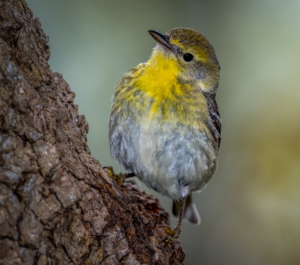
Learn how to engage your students in citizen science through a place-based approach. In this hybrid online and in-person workshop you’ll get an introduction to the fundamentals of place-based learning, participate in citizen science projects at Manomet, and learn about how songbird populations are changing in response to human development. Develop guidelines, strategies and a lesson plan to support all students as you establish citizen science environmental monitoring projects relevant to your school community.
Manomet Observatory is an outdoor laboratory and demonstration property for science and education. During our in-person day at Manomet you will target MA STE MS-LS2: Ecosystems: Interactions, Energy and Dynamics by participating in one or more of Manomet’s ongoing environmental monitoring programs. Manomet’s research on the phenomenon of bird migration is one of the longest-running in North America, and you’ll explore Science and Engineering Practices as you use models to understand the process of bird banding, and conduct inquiry investigations and evaluate data to see how songbird populations are changing in response to human activities. The experience will culminate with a chance to interact with live birds and see the banding process first hand! Participants will also be provided with a curriculum packet to use in their classrooms.
Workshop Highlights:
 Explore how place-based learning can generate an inclusive science learning environment for all students
Explore how place-based learning can generate an inclusive science learning environment for all students- Create a lesson plan to engage your students with citizen science and environmental monitoring in their community
- Investigate the phenomenon of bird migration
- Learn directly from scientists and education professionals
- Receive a curriculum packet to use in your classroom
Arrange for this workshop for your school or school district:
Contact the Wade Institute at 617-328-1515 or wadeinstitute@wadeinstitutema.org.
Remote Learning Program
Science Inquiry During Remote Learning:
Engaging Students in the Science and Engineering Practices
for Grades 3-8 Educators
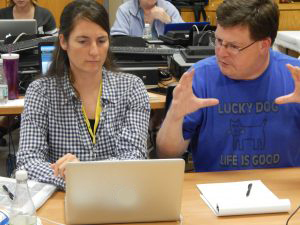 Join the Wade Institute staff to explore grade-specific, minds-on, hands-on investigations that meet the MA Science, Technology and Engineering Standards. Explore what the Science and Engineering Practices look like in the remote classroom. Investigate strategies, tools and methodology for teaching science in combined remote/virtual settings as well as hybrid (virtual and classroom combined). Develop a toolkit of resources and lesson plans to use with your students. Participants will receive a materials kit for the workshop.
Join the Wade Institute staff to explore grade-specific, minds-on, hands-on investigations that meet the MA Science, Technology and Engineering Standards. Explore what the Science and Engineering Practices look like in the remote classroom. Investigate strategies, tools and methodology for teaching science in combined remote/virtual settings as well as hybrid (virtual and classroom combined). Develop a toolkit of resources and lesson plans to use with your students. Participants will receive a materials kit for the workshop.
Arrange for this workshop for your school or school district:
Contact the Wade Institute at 617-328-1515 or wadeinstitute@wadeinstitutema.org.
SeaPerch Program
Underwater Robotics Workshop for Middle & High School Educators: Build a SeaPerch!
Bring along up to 2 students to help build!
• Build your own model remotely-operated vehicle (ROV)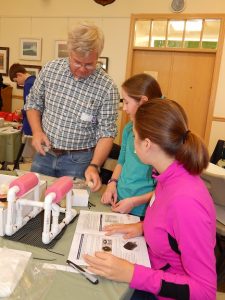
• Become a pilot and take it to the bottom of the pool and estuary
• Discover how to “hack” your SeaPerch and to modify it for exciting science projects
• Take back lots of STEM resources for your classroom
• Explore resources from the national SeaPerch program
• Learn how to apply for a classroom set of SeaPerch kits
• Earn 13 PDPs
The SeaPerch program brings hands-on, minds-on engineering design concepts and scientific principles into the middle and high school classroom. Students build model ROVs from kits using PVC pipe and other easily obtainable materials. During the SeaPerch workshop, teachers and students build and test a SeaPerch. Students who participate in SeaPerch programs become engaged in engineering concepts, problem-solving, teamwork, and technical applications. Engineering and science investigations using the ROV are explored, as well as citizen monitoring programs.
Curriculum resource materials are provided which support the Science and Technology/Engineering Standards, bringing together basic engineering design skills and the science practices. Concepts incorporated into the curriculum resource materials include marine science, oceanography, biomimicry, ocean engineering, physics, robotics, mathematics, and marine-related careers.
Bring along up to 2 students to become student leaders for a SeaPerch team at your school!
Check back to see when we’re offering our next SeaPerch program!
Arrange for this workshop for your school or school district:
Contact the Wade Institute at 617-328-1515 or wadeinstitute@wadeinstitutema.org.
Sustainable Energy Workshops
2 Day Workshop for Middle and High School Educators
Lighting the Way with Wind and Solar: Pathways to a Sustainable Energy Future
Connect with scientists and educators from the Wade Institute for Science Education and Mass Audubon, gain an understanding of the power of inquiry-based learning to inspire a passion for science in students, and come away energized!
Hands-on, Minds-on Learning:
During this two-day professional development workshop, experiment with renewable energy technologies to understand how they can be used to produce sustainable electricity and reduce human impacts on the climate. Engage in hands-on, minds-on activities as you build a solar-powered fountain, design the best blades to catch the wind, and compete to fill an electrical grid with the most effective energy sources. Discover first-hand how wind turbines and solar panels generate power, and why communities are relying increasingly on these systems to meet their energy needs.
Practical Tools to Meet MA Standards:
Lighting the Way with Wind and Solar: Pathways to a Sustainable Energy Future will integrate science content with the Science and Engineering Practices. Find out more about how energy, climate change, and sustainable solutions connect to the 2016 MA Science and Technology/Engineering standards. Walk away with inquiry-based activities and a kit of equipment you can use to get started with your own students.
Arrange for this workshop for your school or school district:
Contact the Wade Institute at 617-328-1515 or wadeinstitute@wadeinstitutema.org.
Marine Environments Workshop
2 Day Workshop for Grades 4-12 Educators
Marine Environments ‘Make & Take’: Exploring the Coastal Environment in the Field and Classroom
During this two-day professional development workshop, engage with scientists in the field to explore the diversity of life in dynamic, ever changing coastal environments and discover how technology can be used to enhance the study of aquatic ecosystems.
Get hands-on experience conducting a marsh transect and a beach profile, learn about techniques used to monitor marine biodiversity, test water quality, and identify wildlife population shifts in local habitats, Build your own collection of sampling tools to use with your students. Your tool kit will include transect tools, a water sampler, dip nets, plankton nets, beach profiling tools, and more.
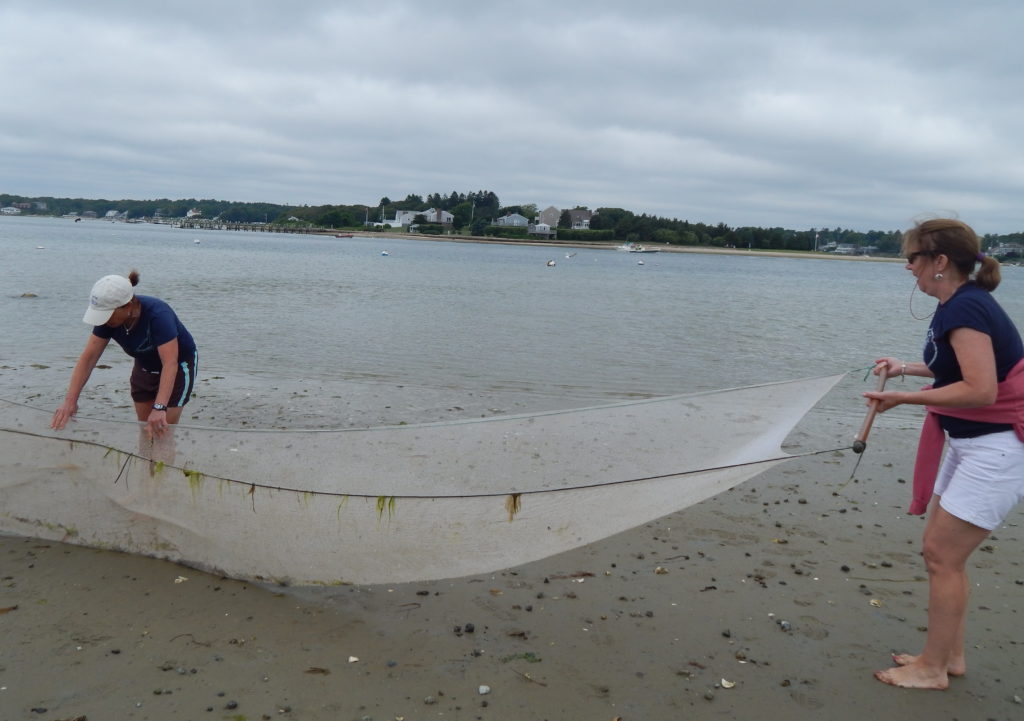
Marine Environments ‘Make and Take’ will integrate science content with hands-on, minds-on inquiry investigations. Explore using the Science and Engineering Practices as you make connections to the 2016 MA Science and Technology/Engineering standards.
Gain experiences and ideas that will help you build your curriculum around inquiry-based science investigations and take home a collection of teaching resources, lesson plans, and easy-to-make marine sampling equipment.
Arrange for this workshop for your school or school district:
Contact the Wade Institute at 617-328-1515 or wadeinstitute@wadeinstitutema.org.
STE Standards Program
Building a Foundation for Implementing the 2016 MA Science and Technology/Engineering Standards
A one-day workshop for curriculum and school leaders offered by the Massachusetts Science Education Leadership Association (MSELA) and the Wade Institute for Science Education.
Compare the 2016 Standards with the 2006 Standards and discuss classroom implications
Examine the K-12 progressions of content and science/engineering practices that are central to the 2016 STE Framework
Explore the progression of the Disciplinary Core Ideas from K-12 and how this impacts implementing the revised STE Standards into your school district’s curriculum
Investigate Next Generation Science Standards (NGSS) Cross-Cutting Concepts in the MA STE Standards
Examine aspects of the Frameworks that are essential to a smooth and effective transition to the new STE standards!

 Participate in hands-on, inquiry science investigations that integrate science and literacy skills
Participate in hands-on, inquiry science investigations that integrate science and literacy skills